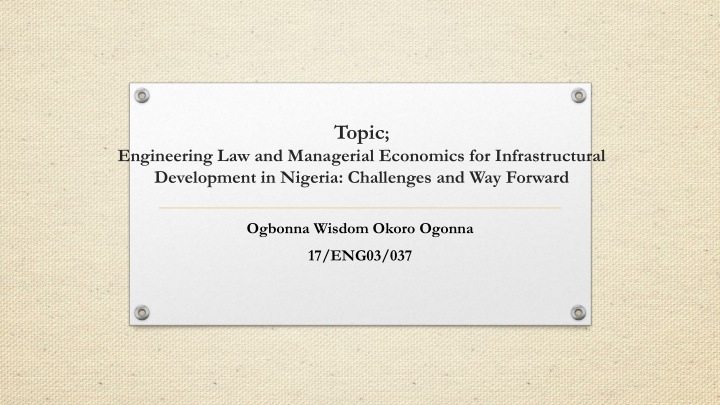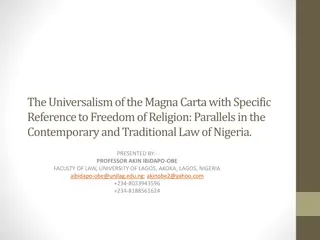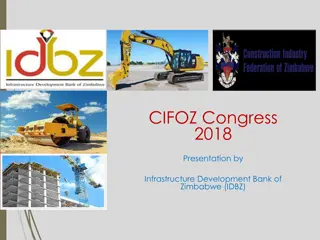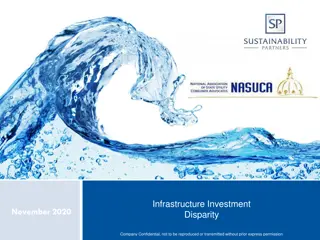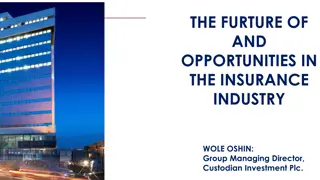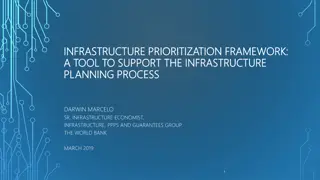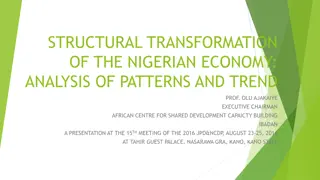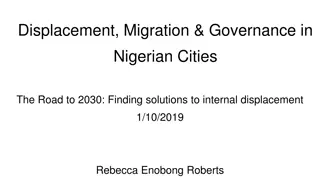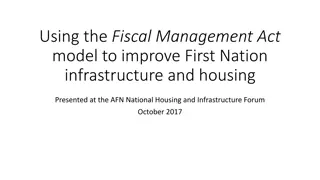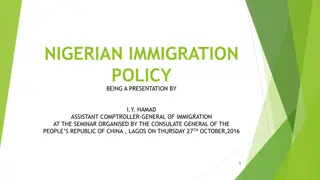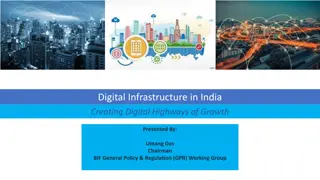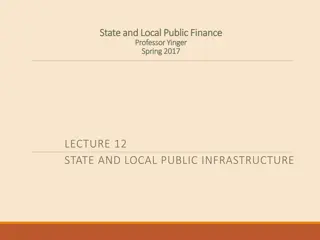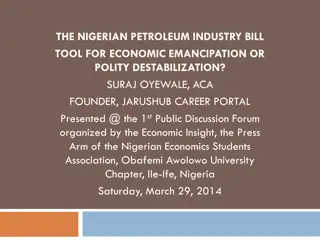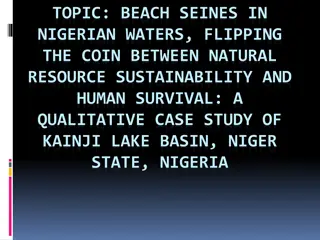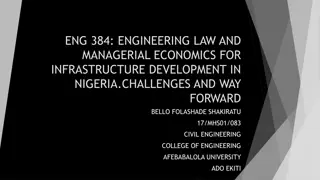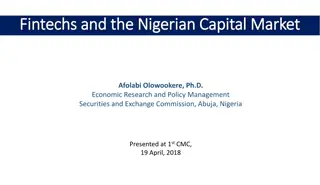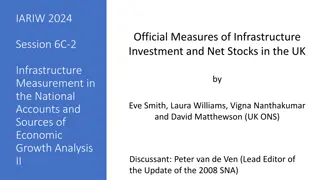Challenges and Solutions in Nigerian Infrastructure Development
Nigeria faces significant infrastructural challenges in power, transportation, water, security, education, and healthcare systems. This article explores these issues and proposes solutions using engineering law and managerial economics.
Download Presentation

Please find below an Image/Link to download the presentation.
The content on the website is provided AS IS for your information and personal use only. It may not be sold, licensed, or shared on other websites without obtaining consent from the author.If you encounter any issues during the download, it is possible that the publisher has removed the file from their server.
You are allowed to download the files provided on this website for personal or commercial use, subject to the condition that they are used lawfully. All files are the property of their respective owners.
The content on the website is provided AS IS for your information and personal use only. It may not be sold, licensed, or shared on other websites without obtaining consent from the author.
E N D
Presentation Transcript
Topic; Engineering Law and Managerial Economics for Infrastructural Development in Nigeria: Challenges and Way Forward Ogbonna Wisdom Okoro Ogonna 17/ENG03/037
TABLE OF CONTENTS 1. INTRODUCTION 2. DEFINITIONS 3. MAJOR INFRASTRUCTURAL PROBLEMS IN NIGERIA POWER TRANSPORTATION WATER SECURITY POOR EDUCATION POOR HEALTH SYSTEM 4. ENGINEERING LAW AND MANAGERIAL ECONOMICS AS THE WAY FORWARD 5. RECOMMENDATIONS 6. CONCLUSION
DEFINITIONS Engineering; This is the use of scientific principles to design and build machines, structures, and other items, including bridges, tunnels, roads, vehicles, and buildings Engineering Law; This is the application of laws applying to the practice of professional engineering. Engineering law is the study of how ethics and legal frameworks should be adopted to ensure public safety surrounding the practice of engineering Managerial Economics; This deals with the application of economic concepts, theories, tools and methodologies to solve practical problems in a business. In other words, managerial economics is the combination of economics theory and managerial theory Infrastructure; The basic physical and organizational structures and facilities (buildings, roads, power supplies) needed for the operation of a society or enterprise.
INTRODUCTION Infrastructure generally refers to basic structures, systems and facilities that enable accomplishment of social and economic goals, while governance encompasses the state s institutional and structural arrangements, decision- making processes, and policy formulation and implementation capacity to make this happen. Despite these fundamentals, Nigeria has found it difficult to convert her unique advantages into economic and social benefits for the country and the majority of her citizens. Over the past years, the government on seat allocates huge sums of money to the development of the country s infrastructural sector but to no avail. In fact, the country s infrastructure is in a decline. Here underneath are the major sectors of the country s infrastructure. We will discuss the problems each of these sectors face and of course, how these problems could be tackled with Engineering Law and managerial economics.
MAJOR INFRASTRUCTURAL PROBLEMS IN NIGERIA POWER: Nigeria is the largest economy in sub-Saharan Africa but limitations in the power sector constrain growth. Nigeria is endowed with large oil, gas, hydro and solar resource, and it already has the potential to produce 12522 megawatts of electric power from existing plants, but most days is only able to produce about 4000 MW, which is very insufficient. Nigeria has privatized its distribution companies, so there is a wide range of tariffs. Currently, only 40% of Nigeria s population is connected to the energy grid whilst power supply problems are encountered about 60% of the time. At best, average daily power supply is estimated at four hours, although several days can go without any power at all.
FIG.3.1. PEOPLE QUEING UP TO CHARGE PHONES IN ONLY AVAILABLE LIGHT SOURCE
TRANSPORTATION: In Nigeria today, the transportation system includes, road, railway, air and sea transportation. Of all these modes of transport, the most used by Nigerians is road transport. However, the state of road transportation in the country is very poor. One of the major problems of road transport in Nigeria is the state of most road networks. Some of the recently constructed road infrastructures are constructed with fairly built materials. This is majorly as a result of corruption from both the people awarding the contracts and the construction companies. Most of the paved roads networks have lost their asphalt surface and are in very bad shape. Some of these roads are almost becoming gravel surfaces. Travelling is very difficult and sometimes almost impossible especially during the raining season due to lots of uneven surfaces, potholes, and eroded areas. Some of the roads are covered by water during the raining season because of lack of proper drainage. The poor state of a lot of Nigerian road networks has most areas dead zones due to the number of accidents that are recorded daily on these roads.
SECURITY; Nigeria in recent times has witnessed an unprecedented level of insecurity. This has made national security threat to be a major issue for the government and has prompted huge allocation of the national budget to security. In order to ameliorate the incidence of crime, the federal government has embarked on criminalization of terrorism by passing the Anti-Terrorism Act in 2011, fundamental surveillance as well as investigation of criminal related offences, heightening of physical security measures around the country aimed at deterring or disrupting potential attacks, strengthening of security agencies through the provision of security facilities and the development and broadcast of security tips in mass media. Despite these efforts, the level of insecurity in the country is still high. In addition, Nigeria has consistently ranked low in the Global Peace Index (GPI, 2012), signifying a worsened state of insecurity in the country.
FIG.3.4 PUBLIC DISPLAY OF AMMUNITION BY THE NIGER DELTA TERRORISTS GROUP
POOR HEALTH SYSTEM; Despite its launch in 2005, Nigeria Health Insurance Scheme, NHIS covers less than 10% of the Nigerian population leaving the most vulnerable populations at the mercy of health care services that are not affordable. This means the most vulnerable populations in Nigeria are not provided with social and financial risk protection. Poor people constitutes about 70% of the Nigerian population. They lack access to basic health services, which social and financial risk protection should provide, because they cannot afford it. CBSHIP was expected to meet their health needs as well as provide social and financial risk protection to this group, which mostly reside in rural areas. As evidenced in the high rate of out of pocket payments for health care services, poor people financially contribute more to health care than official care and funds programs in Nigeria. Out of pocket payments for health care services limit the poor from accessing and utilizing basic health care services, hence, the low coverage of basic health services for the poor.
ENGINEERING LAW AND MANAGERIAL ECONOMICS AS THE WAY FORWARD Majority of the infrastructural challenges in Nigeria, and the world at large can be solved by engineering. In countries where engineering is given priority attention, most infrastructural problems are unheard of. In fact, in countries like China, electricity is a cheap service available to the most remote areas. It isn t just about the availability of resources and manpower. The most important key to their development is the strict laws that guide their engineering practices.
With working engineering law, contracts in the country will be well funded so as to produce results of high quality. Contracts which aren t funded properly should not be started at all. With proper practice of managerial economics, the optimum amount of natural resources needed for infrastructural developmental projects should be allocated to contractors. This way, proper projects will be executed and materials won t be wasted. With proper practice of managerial economics, each government should have predetermined tasks they are meant to achieve under an issued time frame. This way, there will be a way to check for fraudulent activities. With working engineering law, before contracts are given, the contractors should inform the government of the minimum time that the project is meant to remain intact under normal conditions. If these projects don t meet up the requirement in the long run, the contractors are imprisoned.
RECOMMENDATIONS 1. Engineering Law should be strictly written out in the country as part of its constitution. Punishment for culprits should also be stated. 2. All tertiary institutions should add engineering law to their curriculum to create awareness for prospecting engineers in the country. 3. Managerial economics programs should be held nationwide to teach people the importance of proper utilization of resources available to them.
CONCLUSION With the above points, we have been able to discuss the infrastructural problems in Nigeria today and how engineering law and managerial economics can help solve these problems.
